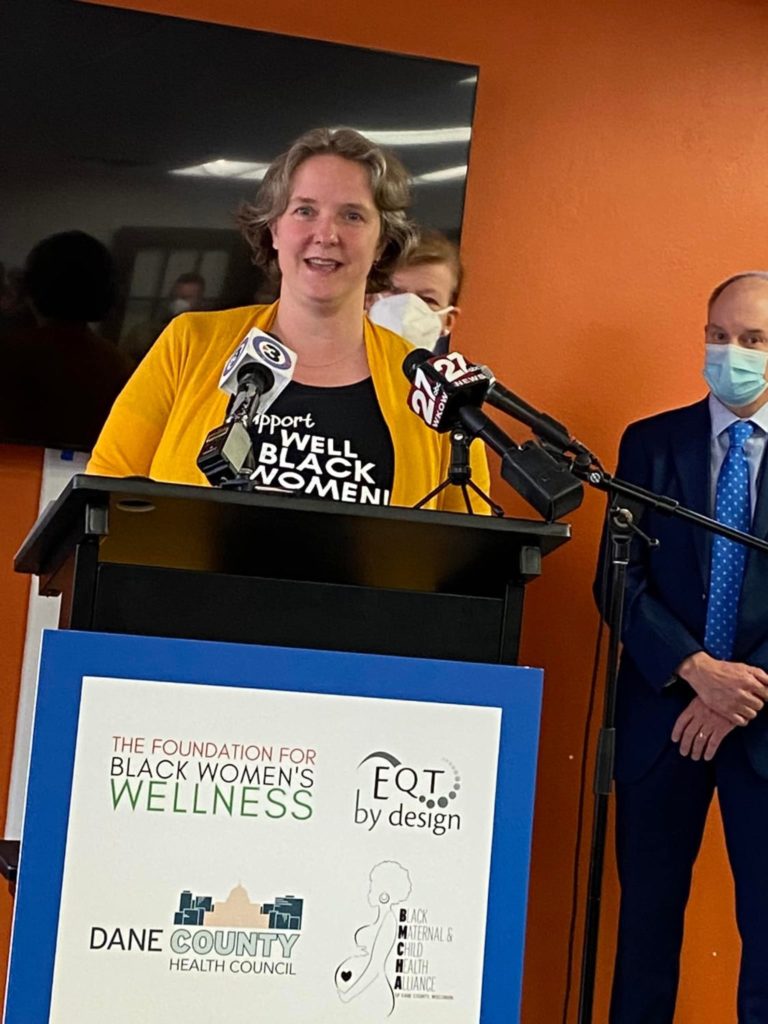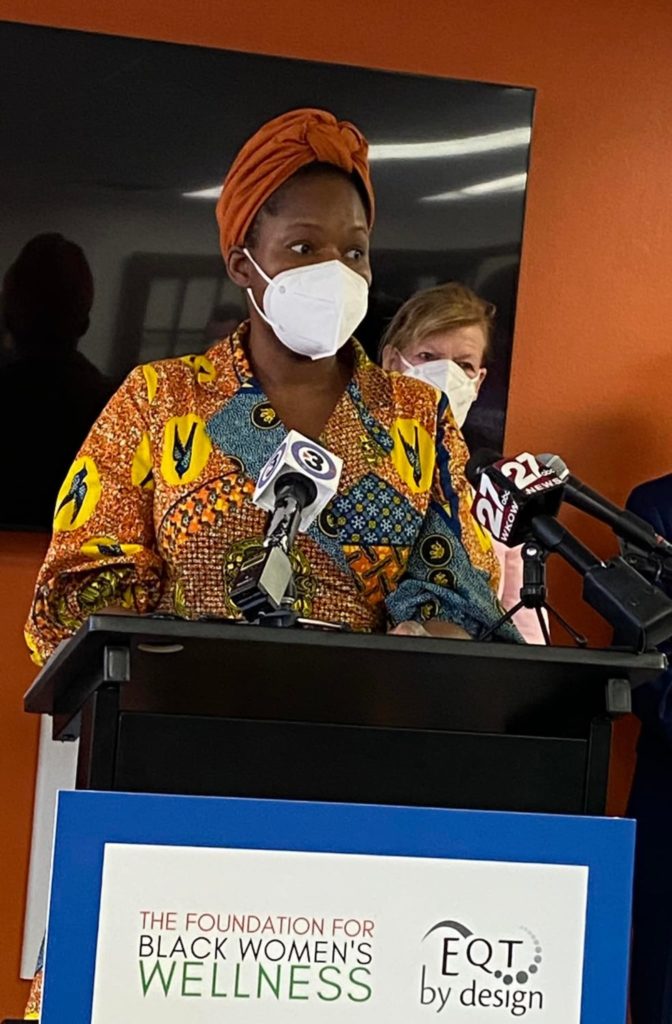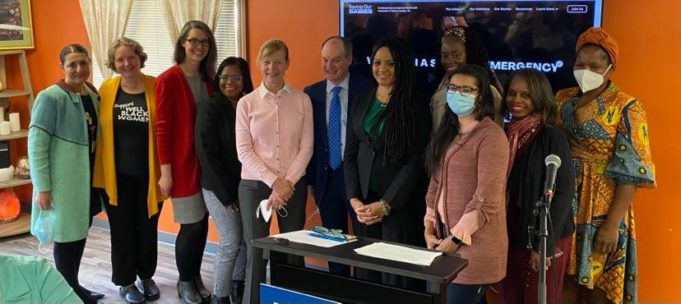The Dane County Health Council (DCHC), The Foundation for Black Women’s Wellness (FBWW), and numerous community health partners hosted a press conference Thursday afternoon at the FBWW headquarters on Madison’s west side to announce the launching of ConnectRx Wisconsin, a giant step forward to improve health outcomes for Black women, birthing persons and babies.
“We’re proud to demonstrate through ConnectRx how systems, Black women and communities can work together to reimagine, rebuild and implement new solutions that we really believe will move the needle forward in eliminating racial birth disparities,” said Lisa Peyton-Caire, founder, CEO and president of The Foundation for Black Women’s Wellness at the press conference. “And we want to see this effort grow and succeed. We believe it’s a model that can really carry forward across communities in Wisconsin, across our state.”
ConnectRx Wisconsin is a new care coordination system supporting Black pregnant women and birthing persons to gain greater access to health care and family-stabilizing resources that fill potentially unmet social needs such as food, financial assistance, housing, employment and transportation. It is designed to reduce the occurrence of low birth weight and improve birth outcomes for Black women, birthing persons and babies in Dane County.

Sen. Tammy Baldwin told the audience at the press conference that she was proud to join everybody at the event during Black Maternal Health Week (April 11-17).
“ConnectRx will address the critical needs for this community. Wisconsin continues to have, sadly, one of the nation’s worst records for Black infant mortality, and African Americans in our state are still experiencing worse overall health and mental health outcomes than any other group,” Baldwin said. “In Dane County. babies born to Black mothers are two times more likely to be born with low birth weights than babies born to white mothers. And this disparity not only threatens children’s lives, but also puts those children at increased risk for significant health and developmental challenges.
“The ConnectRx program’s comprehensive care coordination model understands that there are many social determinants in a person’s health and well-being,” she added. “In many disjointed health and social service systems, ConnecRX will help bridge these divides and connect Black mothers with the resources they need to improve health outcomes for themselves. I’m excited to deliver $3 million investment and play a part in this transformative program to improve equity in our community.”

(Photo by David Dahmer)
The system launch was led by Dane County Health Council, the Foundation, its project partner EQT By Design and several other key partners. The DCHC is a coalition of healthcare providers, government and nonprofits with a mission to eliminate gaps and barriers to optimal health and reduce disparities in health outcomes in Dane County. Council members include Access Community Health Centers, Black Maternal and Child Health Alliance, and Group Health Cooperative of South Central.
“This is a mission many, many years in the making to improve the health outcomes for Black women, birthing persons and babies and we have what I think is a really innovative part of the solution – a system that’s going to provide the tools needed to ensure that frontline staff is able to connect families with the resources that they need,” said Madison Mayor Satya Rhodes-Conway. “Not just to improve their health, but to take better control of their health outcomes.
“So thank you to The Foundation for Black Women’s Wellness for doing not just this incredible work, but all of the incredible work that you do,” she added. “We know the need is really great, particularly here in Dane County and in Madison. We all know the disparities and the statistics and how critical they are.”
Back in 2018, DCHC commissioned the Foundation and EQT By Design, a Madison business founded by Annette Miller with experience in strategic advising and planning, to conduct a community engagement effort that specifically centered Black women and community members to weigh in on the issue. Over a nine-month period, they engaged more than 300 Black community members and service providers across Dane County to identify root causes of these disparities as well as solutions to improve Black birth outcomes in the county.
The groundbreaking Saving Our Babies Report was a culmination of all of this work and shined light on the stress caused by economic insecurity, racism and bias in the daily experiences of Black women and families, as well as disconnected and difficult-to-navigate community health services.
“As Lisa explained earlier, our partners gathered here today have committed to using ConnectRx and caring for Black birthing people and their families in our community. As we talk with our patients and our clients, we will use screening questions to see if they’re negatively impacted by social determinants of health like access to healthy food and safe housing,” said Dr. Ken Loving, CEO of Access Community Health Centers. “We will then offer those patients that connection to community health workers and support services to assist them in meeting their needs. We’re working specifically to support Black families because they have higher rates of low birth weight babies and infant mortality in the first year of life. Our state in our county have some of the worst disparities in the country. And that cannot continue.
“We see it as our responsibility to work with the communities we serve to create the best health outcomes possible. We understand that food and transportation and housing and economic stability are key factors to health and well-being,” he continued. “We’re committed to working beyond the four walls of our hospitals and clinics to ensure that patients have access to needed resources. We understand that racism is a public health crisis and has contributed to the marginalization and inequitable access to health care, and other resources.

Loving added that instead of acting as individual health systems in this effort, “we act collectively.”
“We will combine our knowledge in the areas of research, clinical delivery systems, workforce, and technology to move this effort forward and improve the care and the outcomes for Black families and their babies,” he said. “Our work together will ensure that a single ConnectRx Wisconsin system is in place to seamlessly connect patients to local community support services that can meet their needs. ConnectRx is a key step in our journey to improve the health and lives of Black families.”

Access Community Health Centers, Group Health Cooperative of South Central Wisconsin, SSM Health, UnityPoint Health – Meriter and UW Health are invested in ConnectRx and have implemented the tool and will facilitate referrals and follow-ups with their patients.
“It is an honor and a privilege to be here today to celebrate a revolutionary change, a revolutionary paradigm shift,” said Dr. Tiffany Green, assistant professor of population health sciences and obstetrics and gynecology at the UW School of Medicine and Public Health, and co-chair of the Black Maternal & Child Health Alliance of Dane County. “It is a program and this is a process that’s going to center the lives of Dane County’s Black women and birthing people in solving our persistent and frankly shameful disparities in birth outcomes.”
ConnectRx is powered by tools developed by Verona-based healthcare software giant, Epic Systems. It includes a screening process used by several Dane County health systems to identify both medical and non-medical needs of patients, a community-based workforce dedicated to connecting patients with local resources and a shared care coordination and referral technology.






























